An Emergency Within an Emergency: The Crises of Climate Change and Female Genital Cutting
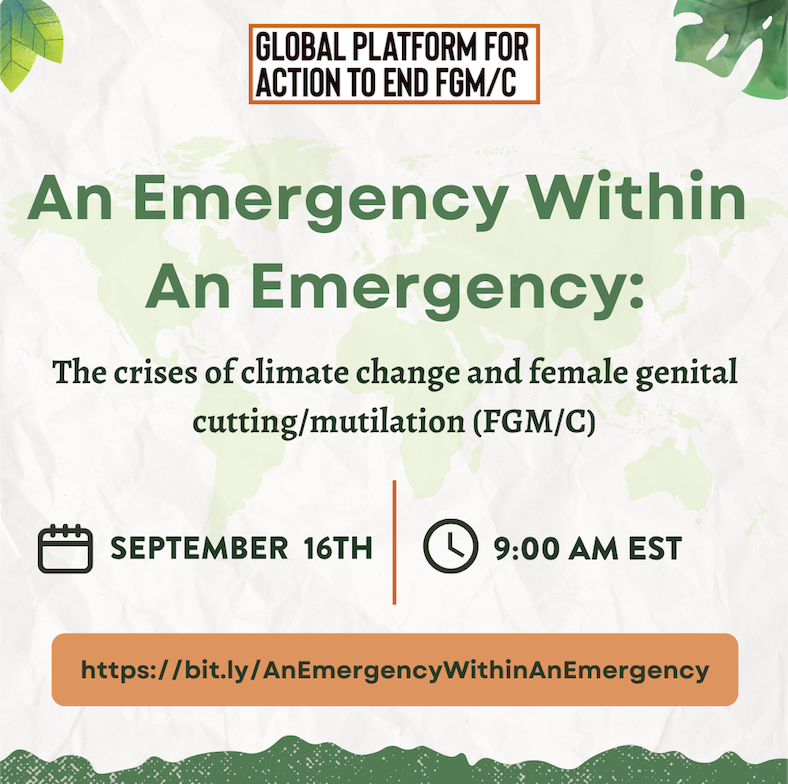
Date: September 16th, 2022 Time: 9 am EST Register here today: https://bit.ly/AnEmergencyWithinAnEmergency It is an understood global reality that women and girls are facing the harshest impacts of climate change, and activists across the world continue to fight for the inclusion of women and girls in climate change mitigation and adaptation strategies. Yet, too little is being done to address the multitude of ways in which climate change disproportionately impacts women and girls. One of the common, but often overlooked, impacts of climate change is on female genital mutilation/cutting (FGM/C). Defined by the WHO as any procedure that involves the removal of the external female genitalia for non-medical reasons, FGM/C is internationally recognized as a human rights violation. For many girls across the globe, climate change has only served to make them more vulnerable to this form of harm. Join the Global Platform for Action to End FGM/C on September 16th at 9 am EST as we explore the impact of climate change on female genital mutilation/cutting and hear from the activists themselves who are working to uplift girls in their communities about what can be done. For this event, we will be joined by world-famous activists Eva Komba and Domtila Chesang alongside award-winning journalist Neha Wadekar as they explore their work and experience with this growing issue. This panel will also be moderated by Sahiyo co-founder and passionate activist against FGM/C Mariya Taher. Mariya Taher has worked in gender-based violence for over a decade in the areas of teaching, research, policy, program development, and direct service. In 2018, Mariya received the Human Rights Storytellers Award from the Muslim American Leadership Alliance. In 2020, she was recognized as one of the six inaugural grant recipients for the Crave Foundation for Women. Since 2015, she has collaborated with the Massachusetts Women’s Bar Association to pass legislation to protect girls from FGC. After starting a Change.org petition and gathering over 400,000 signatures, Massachusetts became the 39th state in the U.S. to do so. She also sits on the steering committee for the US End FGM/C Network. As of 2021, Mariya serves as an expert consultant for the Department Of Justice Addressing Female Genital Mutilation/Cutting technical assistance project. Eva Komba is an experienced development professional in the area of international gender and development expert with 10 years of experience. She has major competencies in matters of Public Policy Formulation and Research, Access to gender justice, Sex and Gender Based Violence Programming and Implementation, Ending Harmful Traditional Practises and Combating Trafficking of Women and Girls in Africa. She is also skilled in the area of Monitoring and Evaluation, Gender Responsive Budgeting, Gender Mainstreaming as well as Women Empowerment. Domtila Chesang is a champion fighting to end FGM, child marriage and other harmful cultural practices. She has been advocating for girls and women’s rights since 2014 through various initiatives. As a full time women’s rights advocate, she founded the I_Rep Foundation, which is a community based organization that she uses as a vehicle to create awareness around these issues and provides platforms at the community levels for learning and dialogue. Because of her fearless campaigns and passion for girls and women’s rights protection and empowerment in her community, she has received a number of recognitions both locally and internationally. In 2017, she was among three Kenyans to receive the prestigious Queens Young Leaders Award presented by the Queen of England in Buckingham Palace. In 2018, she was recognized as the African Youth Leader of the year. She was nominated as the Human Rights Defender of the year in 2019. She is also a founding member of the African Women’s Rights Advocate. Neha Wadekar is an independent multimedia journalist reporting across the globe. She reports at the intersections of climate, gender, conflict, health, human rights, emerging democracies, and politics. Neha’s written and video work has been published in The New York Times, The Washington Post, The New Yorker, The Atlantic, The Wall Street Journal, The Economist, PBS NewsHour, the Los Angeles Times, The Guardian, Mother Jones, CNN, and others. She has received fellowships from the Pulitzer Center for Crisis Reporting, the United Nations Foundation, the Fuller Project, the Overseas Press Club, the International Women’s Media Foundation, and the Groundtruth Project.
Sahiyo team speaks at The Pre-Summit of#EndFGM Global Conference
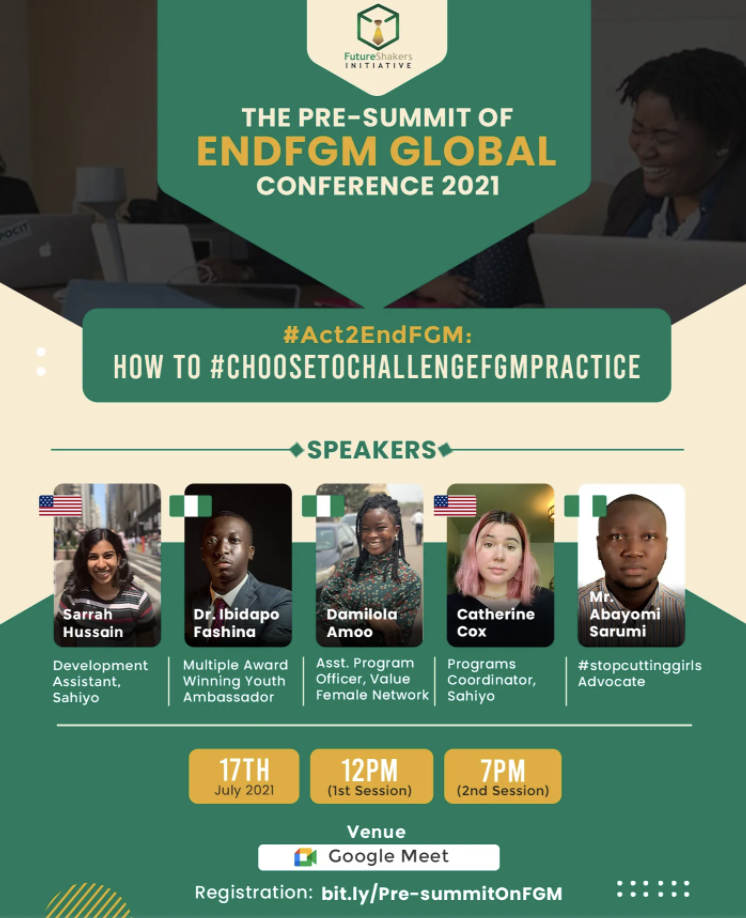
On July 17th, Sahiyo’s Development Assistant Sarrah Hussain and Programs Coordinator Catherine Cox spoke at a panel discussion on female genital mutilation/cutting (FGM/C) hosted by the Future Shakers Initiative (FSI). This event, The Pre-summit of #EndFGM Global Conference, was the prelude to the conference. The summit was an online webinar convening international speakers and advocates to share ideas and prepare for the in-person conference. As part of The Pre-summit of the #EndFGM Global Conference, Hussain and Cox were joined by Dr. Ibidapo Fashina, Abayomi Sarumi, and Damilola Amoo, moderated by FSI founder, Tobi Olanipekun. During the two-session event, this group of activists and change-makers convened over Google Meet to discuss their roles in challenging FGM/C, and how to build global bridges to advocate for the end of the practice. This inspirational panel of speakers explored the health consequences of FGM/C; the justifications and social norms underpinning the practice; and how we all can become better activists in empowering our communities to end the practice. During the event, the speakers had the opportunity to answer critical questions such as, “What human rights does FGM/C violate?” and “How can young people challenge FGM/C?” Our team highlighted how FGM/C is practiced on young girls without consent and is a violation of the rights of girls. FGM/C also violates a person’s rights to health, security, and physical integrity, the right to be free from torture and cruel, inhuman, or degrading treatment, and the right to life, as this practice can result in death. We additionally stressed Sahiyo’s belief in the power that storytelling can create change, spark healing, and inspire individuals and communities to advocate for the abandonment of FGM/C. We believe that highlighting and amplifying the voices of survivors can be a powerful way to challenge FGM/C, the norms of silence and shame that often keep women from speaking out, and to give space for survivors to heal. During the question and answer session at the end of the event, one guest asked how modern technologies are being utilized to help end FGM/C. Sahiyo speakers highlighted the initiative, Mumkin, an app that was created by Sahiyo’s co-founders Priya Goswami and Aarefa Johari. This is an app that uses artificial intelligence to help activists practice having difficult conversations around FGM/C. We encourage all of our allies to download this app in order to help them practice having critical conversations around FGM/C. The Pre-summit of the #EndFGM Global Conference was an eye-opening exploration of the many issues and concepts surrounding FGM/C, as well as the need for global connections and idea-sharing to foster a global community dedicated to ending FGM/C and all forms of violence against women and girls. The #EndFGM Global Conference will be taking place in-person in Nigeria later this year. If you are interested in having a member of Sahiyo speak at an event at your institution, please email our team: info@sahiyo.com. You can also fill out our request for an outreach presentation form here.
The End FGM European Network hosts webinar: “Addressing female genital mutilation while leaving no one behind”

By Madrisha Debnath The End FGM European Network hosted a webinar titled, “Addressing female genital mutilation/cutting (FGM/C) while leaving no one behind,” to discuss FGM/C and the framework of intersectionality in February. The speakers of the event included Helena Dalli, EU Commissioner for Equality; Aïda Yancy, an LGBTQ+ feminist, anti-racist activist currently working at RainbowHouse Brussels and an expert on FGM/C; Hadeel Elshak, Youth Ambassador of End FGM European Network; and Sietske Steneker, UNFPA Brussels Director. Keynote speaker Dalli addressed the data regarding FGM/C among the European Union member countries. According to the European Institute for Gender Equality, 600,000 to 900,000 women and girls are at risk of FGM/C in thirteen European countries alone. The European Commission is working to end the practice of FGM/C with an intersectional approach. Working with ground level activists, community-based workers and survivors to understand the different ways in which each woman is affected is crucial toward encouraging the abandonment of the practice. Avoiding stigmatisation, racism, and xenophobia is imperative for ending gender-based violence and structural inequality. Yancy explained the concept of intersectionality originating from Black Feminist Theory. The term was coined by Kimberlé Williams Crenshaw (1989) in her seminal work, “Demarginalizing the Intersection of Race and Sex: A Black Feminist Critique of Antidiscrimination Doctrine, Feminist Theory and Antiracist Politics.” Intersectionality happens when a person is at the crossroads of more than one systematic oppression. The marginalized people who are standing at the crossroads, for example, a black woman or a woman of colour, is not only facing racism and sexism, but is subjected to something bigger that comprises the effect of both sexism and racism. Intersectionality doesn’t mean simply adding the systemic oppression that a person is facing. Rather, it means that the effect is cumulative instead of being additive since these categories of oppression are not mutually exclusive. Intersectionality is more than a concept; it’s a tool to identify issues of access for marginalized people. Since social institutions work in a single lane fashion, recognising oppressions exclusive of one another by using intersectionality as a tool will help to identify social issues. Elshak talked about her identities of being black, woman, Muslim, Sudanese, young, and of the first generation to be living in United Kingdom, as well as how her multiple identities have shaped her everyday experiences. She shared her experiences of forming the “Youth Engagement Manifesto: Tackling FGM in Europe- Strategies for Effective Engagement of Youth from FGM-affected communities.” She talked about how, in being young, she has disrupted the general notion of older people being wiser, and made her opinion known in advocating against FGM/C. Steneker presented the report on the state of the world population on harmful practices titled, “Against My Will: Defying the Practices that Harm Women and Girls and Undermine Equality,” by the United Nations Populations Fund (UNFPA) that include nineteen different types of harmful practices, including virginity testing, child marriage, breast ironing, body modifications, female genital cutting, and other harmful practices controlling women’s bodies and sexualities. According to the report, over 200 million girls and women have undergone some form of genital cutting. An estimated 52 million women and girls worldwide have undergone the practice performed by medical practitioners, doctors, nurses or midwives. Girls who are forced into marriage as children may also be survivors of FGM/C or are at a higher risk. Everyday an average of 33,000 girls are being forced into marriage. Watch “Addressing female genital mutilation while leaving no one behind.”
Four women who were pivotal to the movement to end female genital cutting

By Megan Maxwell The movement to end female genital cutting (FGC) has been in effect starting as far back as the latter half of the 19th century through the voices, writing, and research of women who have worked for the rights of women and girls. FGC is present in 92 countries. In honor of Women’s History Month, Sahiyo is honoring four women from Egypt, India, Senegal, and Austria who changed the world for women and girls. Nawal El Saadawi & her brutal honesty Nawal El Saadawi, a doctor, feminist and writer, who was born in a community outside of Cairo, Egypt, was a survivor of FGC. She campaigned against FGC and for the rights of women and girls throughout her life. She started by speaking out against her family’s preconceived notions about the trajectory of a girl’s life and then used her voice to condemn FGC and women’s rights abuses through her books. She wrote many books including The Hidden Face of Eve, a powerful account of brutality against women, and saw women live those realities detailed in the book within the communities in which she worked as a medical doctor. She was a crusader but her work was banned. She was imprisoned and suffered death threats. Through her work, she championed for the rights of girls and women globally for decades. She died on March 21st at 89 years old. Rehana Ghadially & All for Izzat In 1991, Rehana Ghadially wrote an article entitled All for Izzat in which she examined the prevalence of female genital cutting and its justification. For this article, she interviewed about 50 Bohra women and found the three most common reasons given for FGC: it is a religious obligation; it is a tradition; and it is done to curb a girl’s sexuality. Through these interviews, Ghadially revealed that the procedure of FGC was anything but symbolic. “The girl’s circumcision has been kept an absolute secret not only from outsiders but from the men of the community,” she said. Ghadially experienced FGC when she was very young. Her research allowed her to share with the world the reality of what Bohra girls and women go through as a result of FGC. Ndéye Maguette Diop & the Malicounda Bambara community The community of Malicounda Bambara in Senegal, West Africa, was substantially influenced by the Community Empowerment Program (CEP): a program established by Tostan that engages communities in their languages on themes of democracy, human rights (including female genital cutting), health, literacy, and project management skills. In July of 1997, the CEP empowered the women of Malicounda Bambara to announce the first-ever public declaration to abandon female genital cutting to the world. Ndéye Maguette Diop was the facilitator for the CEP in Malicounda Bambara. She guided them through the program, which is designed to not pass judgment on the practice, but simply to provide information regarding FGC and its health risks. Diop used theater, a traditional mode of African communication and arts, as a means to better facilitate the exchange of ideas. “The women didn’t have any knowledge of these rights beforehand and had never spoken of FGC between themselves,” Diop said. As the result of reenacting a play, these women started to talk about FGC frequently with Diop and she said they “decided to speak about the harmful consequences on women’s health caused by the practice with their ‘adoptive sisters’ [a component of the CEP], as well as with their husbands.” Thanks to Diop, the conversation on FGC was opened up to the women of Malicounda Bambara. They took it upon themselves to investigate within their community until they concluded that the practice should be abandoned. Fran Hosken & her ideas of global sisterhood In 1975, Fran Hosken began writing her newsletter, Women’s International Network News where she reported on the status of women and women’s rights around the globe. The tagline for her newsletter was, “All the news that is fit to print by, for & about women,” and it featured regular sections on Women and Development, Women and Health, Women and Violence, and Female Genital Mutilation (FGM). Every issue of her newsletter had a section on FGM, including names and addresses for her subscribers to get more information on activities surrounding FGC around the world. Hosken was an American feminist and writer, but she was very involved in the livelihoods of women and girls around the globe.Her newsletter became popular for its research into female genital cutting and she ended up writing The Hosken Report: Genital and Sexual Mutilation of Females in 1979. In her book, she reports on the health facts, history, The World Health Organization’s Seminar in Khartoum, The Politics of FGM: a Conspiracy of Silence, Actions for Change, Statistics, Economic Facts, and case histories from several African and Asian Countries as well as the western world. Fran Hosken’s writing and research were extremely influential in the movement to end female genital cutting and continues to be in the modern movement.
Is the United Kingdom backing out of its commitment to end female genital cutting amid the COVID-19 pandemic?
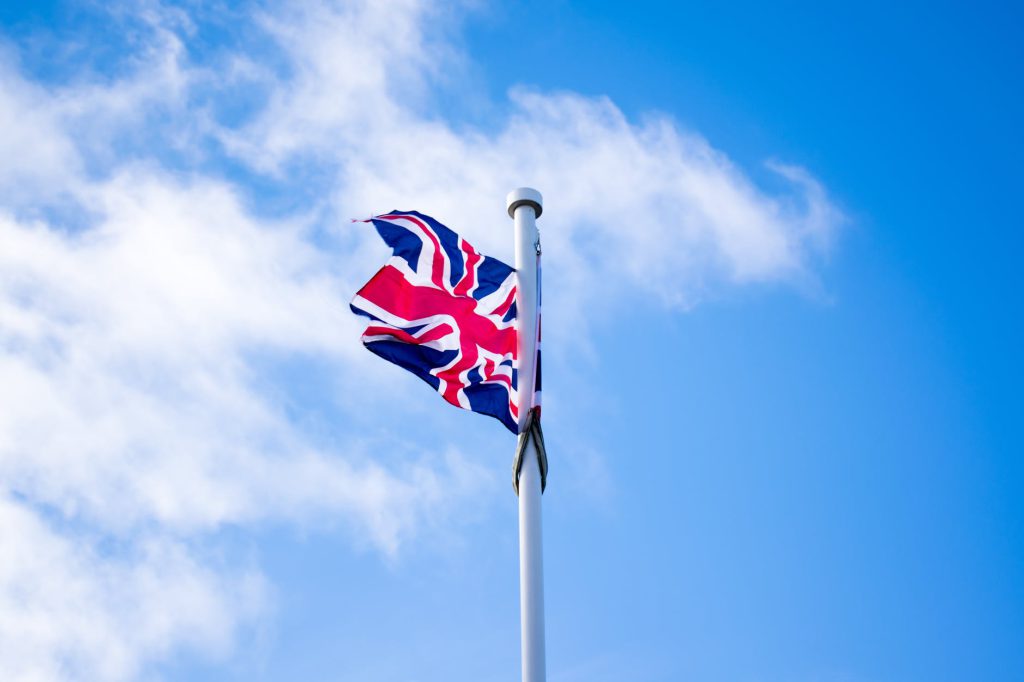
By Olivia Bridge In the midst of a global pandemic set to the backdrop of Brexit, ending violence against women and girls (VAWG) appears to have slipped down the United Kingdom (U.K.) Government’s priority list. Yet, as campaigners and charities are acutely aware, abuse thrives in silence behind closed doors – and women and girls disproportionately pay the price. One form of abuse that charities fear is on the rise is female genital cutting (FGC), a practice which has affected more than 200 million women and girls worldwide, with a further 68 million more estimated to be at risk in the next ten years. It is said that every seven seconds, a girl somewhere around the world faces the potentially agonizing pain and trauma of being cut. What is FGC? The World Health Organisation defines FGC as a procedure which involves the “partial or total removal or the external female genitalia or other injury to the female genital organs for non-medical reasons.” There are four types of FGC that vary in severity, but all types are recognised as child abuse and a violation of women’s and girls’ human rights. In some cases, anaesthetics and antiseptics aren’t used, meaning not only is the initial cutting procedure traumatic, potentially life-threatening and painful, but survivors are at increased risk of blood infections, hemorrhaging and infection throughout their lives, and can face issues with urination, menstruation, pregnancy and penetration. Communities who practice FGC claim it is linked to tradition, faith and ideas around gender roles, insisting girls must preserve their virginity. Many families believe FGC to be a rite of passage for their daughters, and in some communities, it can go hand-in-hand with other practices, such as breast ironing and forced marriage. FGC is a global issue involving at least 92 counties, including the U.K. Despite landmark legislation making those facilitating the practice to be punishable for up to 14 years in prison, girls born to families of these regions in the U.K. are at a heightened risk of being taken abroad under the false pretense of a special ceremony. How prevalent is FGC in the U.K.? In the mere five years that the U.K. has been recording data, 24,420 women and girls have been identified by the National Health Service (NHS) as having undergone FGC, with 6,590 being treated in the year up until March of 2020 alone. 205 victims or survivors were U.K.-born. In total, it is estimated 137,000 women and girls are living with its effects in England and Wales. But many believe the official figure to be the tip of the iceberg considering most survivors (80%) go undetected until they come into contact with midwives or obstetric services. But some women may never come into contact with the NHS at all, including women who don’t have Indefinite Leave to Remain or any form of secure immigration status, in part, either because they are unaware of the support available, or they fear immigration enforcement. What is the COVID-19 impact? However, the COVID-19 pandemic appears to have ramped the practice around the globe. A policy briefing by the Orchid Project in September illuminates the extent, noting, “COVID-19 related lockdowns are being seen as an opportunity to carry out FGC undetected,” across East and West Africa; and “economic hardship is driving increased rates of FGC because of parents seeking ‘bride prices.’” Other research conducted by UNFPA anticipates that as a result of coronavirus disruptions to FGC prevention programmes, as many as two million more cases could take place in the next ten years that would otherwise have been avoided. As such, it estimates a one-third reduction in the progress toward achieving the Sustainable Development Goal of eradicating the practice by 2030. Campaigners attribute the rise to mass school closures, a decrease in access to support and health information, and the economic situation forcing girls into marriage for families to secure a dowry. Indeed, as joint research points to prove, whenever girls are stifled from education, they become increasingly more vulnerable to abusive practices. For this reason, campaigners fear the true scale of gender-based violence is yet to be realised as the U.K. creeps in and out of lockdown and restrictive measures are tweaked every few weeks. Kate Agha, the Chief Executive of Oxford Against Cutting, said, “With the rise in harmful traditions overseas, practicing-communities in the U.K. will come under increased pressure from family abroad to ensure they are part of the group and upholding cultural traditions based on honour.” What is the UK doing about it? The U.K. has remained determined to end FGC, setting a deadline to prevent it from occurring for good by 2030, in line with many other countries. Progress has been commendable. FGC has been outlawed in several Western countries including the U.K., Canada, Spain and New Zealand, among others, including 19 African countries. To date, the U.K. remains the largest donor to support the end of FGC globally, helping 10,000 African communities and assisting six African nations with a budget and new laws to criminalize it. However, amid these trying times, progress seems to be stalling and commitment stuttering behind if the U.K. is to realistically facilitate the end of FGC in the next ten years. For instance, despite being against the law for thirty-five years and a whole host of civil protections and laws being introduced in 2003, there has only been one successful prosecution, which took place in February of 2019. Meanwhile, charities claim social workers and even healthcare practitioners aren’t always trained and equipped to safeguard and handle victims or survivors with there being greater emphasis on support post-procedure than preventing it from happening in the first place. Due to a shocking knowledge gap in Lancashire hospices that emerged in August, medics are now receiving extra training. But how many more remain ill-equipped? Many believe the U.K. is silently withdrawing from its commitment altogether as it emerges that the Home Office has slashed funding from The National FGM Centre which, since its inception
Sahiyo participated in key virtual events with global organizations in October

October was an incredibly busy month for Sahiyo, and we were honored to take part in many events to highlight the issue of female genital cutting (FGC) to various audiences in a multitude of virtual events including a medicalization webinar with #EndFGM Media Campaigns, Fast Tracking SDG 5 by Ending Female Genital Mutilation/Cutting, Digital Storytelling & Advocacy Webinar with StoryCenter, A Girl From Mogadishu + Panel on FGM/C, Council of the Great City Schools Fall Conference, North America and Europe Caucus for CSW International Day of The Girl Child, and Taboo Conversations with RAHMA. #EndFGM Media Campaigns: Medicalization Webinar On October 13th, the Global Media Campaign to End FGM and UNFPA hosted a webinar exploring effective media campaign strategies and approaches to work toward countering a growing trend of medicalization within practicing communities. Speakers included Dr. Amr Hassan, Diana Kendi, Ayotomiwa Ayodele, Hoda Ali, Dr. Mariam Dahir, and Sahiyo U.S. Executive Director Mariya Taher. To watch a replay of this webinar, visit https://fb.watch/1yN240JQra/. Fast Tracking SDG 5 by Ending Female Genital Mutilation/Cutting In honor of the International Day of the Girl, the U.S. End FGM/C Network hosted an event on October 13 titled, “Fast Tracking SDG 5 by Eliminating FGM/C,” as a means to raise awareness and foster important dialogue around ending the harmful practice of FGM/C. The webinar focused on recent developments around the adoption of federal and state-level legislation to end FGM/C in the U.S. and where future policy efforts should focus; common barriers to developing and implementing effective FGM/C abandonment programs (i.e., lack of funding, data, awareness, etc.) and how the community can overcome them; and solutions for prioritizing FGM/C abandonment on the global stage. To watch a recap, view here. The U.S. End FGM/C Network is a collaborative group of survivors, civil society organizations, foundations, activists, policymakers, researchers, healthcare providers, and others committed to promoting the abandonment of FGM/C in the U.S. and around the world. Digital Storytelling & Advocacy Webinar Since 1993, StoryCenter has collaborated with individuals, grassroots groups, and organizations to centralize first-person stories in social justice efforts. The current political reality demands ever-more creative approaches to advocacy. On Oct 14th, in this one-hour free webinar, StoryCenter defined their approach to advocacy with an eye toward clarifying what kinds of stories are effective at community, institutional, and policy levels. They then highlighted research on the role that sharing and listening to personal stories can play in advocacy, and presented a case study of how they have worked with Sahiyo on the Voices to End FGM/C project to position digital storytelling as a key advocacy strategy. A Girl From Mogadishu + Panel on FGM/C On the 14th of October, Cinema for Peace organized a screening of A Girl from Mogadishu together with the University of Southern California. The event included a panel discussion on FGM/C, taking Ifrah’s case as seen in the film, and its current state in the U.S. where 11 states still don’t have laws against it. Democracy, Populism, Coronavirus & Enduring Patriarchal Traditions The first webinar in a series for the Patriarchal Inscriptions: Female bodies contested, invaded defended and owned, this October 15th webinar focused on the persistence of the practice of ‘female circumcision’ and how their encoded cultural undergirding raise critical issues of systemic injustice in the body politics cross-culturally. Speakers included Leyla Hussein OBE, Sahiyo U.S. Executive Director Mariya Taher, Ghada Khan, Julia Antonova, Habiba Al-Hinai and Chiara Cosentino. The event explored the following topics: What weaknesses have come to obstruct efforts to end female genital mutilation? How have governments’ mis/management of the pandemic exacerbated existing fault-lines of gender precarity? How has progress in challenging and abolishing FGM practices been vitiated by widely applied government policies and measures that embrace lockdowns of large parts of public government services, curfews, household quarantine and mandatory individual isolation? How has opposition among members of minority communities in Western societies – when it comes to governments’ FGM policies, deeply felt subtexts of prejudice and popular scapegoating – been appropriated and instrumentalized to serve populist exclusionary aims that demonize entire marginalized cultures? What does the failure of enforcement of anti-FGM legislation uncover about political will, identity politics, the hierarchy of suffering and about inter-/national feminist ambivalences? Council of the Great City Schools Fall Conference Council of the Great City Schools held its 64th Annual Fall Conference virtually in October. Under the banner “Championing Urban Education,” the conference gave big-city school superintendents, board members, senior administrators and college deans of education a forum to discuss issues and share information and best practices to improve teaching and learning. On Oct 16th, Sahiyo participated in a panel event, Unmasking Danger: Identifying High-risk Situations for Urban Students, in which the issues of trafficking and female genital cutting were brought to light and the need to take into consideration that students may be at risk or affected by them. A resource guide created by Council of the Great City Schools on FGM prevention for U.S. schools was also discussed. The guide helps schools to put policies in place to support and identify at risk students. North America and Europe Caucus for CSW International Day of The Girl Child On October 23rd, speakers from around North America and Europe joined in on a virtual meeting to draw attention to the issues of child marriage and female genital cutting. The event was organized by the core group of the Europe and North America CSW/NGO Caucus, including Ulla Madsen, Mary Collins, Zarin Hainsworth, Daniela Chivu, Patricia Masniuk, Luci Chikowero and Nina Smart. Invited FGC Speakers included Isatu Barry, Dr. Ann-Marie Wilson, Mariya Taher, Chiara Cosentino, Angela Peabody. Child Marriage Speakers included Dr. Faith Mwangi-Powell, Honorable Jackie Weatherspoon, Dr. Rochelle Burgesse, Kate Ryan, Dr. Nyaradzayi Gumbonzvanda, and Beverly Bucur. Taboo ConversationsOn October 28th, RAHMA organized a Facebook Live Discussion in partnership with Sahiyo & Global Women Peace Foundation to discuss female genital cutting in the U.S. and the importance prevention work needing to be done, as well as ways to support and empower
Orchid Project releases report detailing the pandemic’s impact on female genital cutting
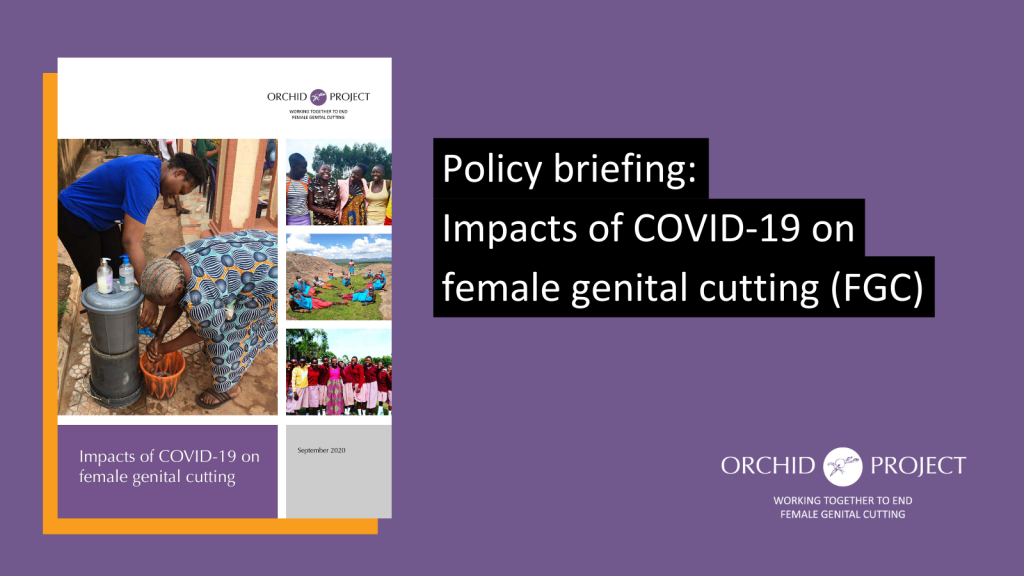
By Hunter Kessous Reports of an increasing rate of female genital cutting (FGC) began early in the pandemic. We are now nine months into the lockdowns and school closures, which have propagated the cutting of young girls. In response, the Orchid Project, decided to further investigate the impact of COVID-19 on the practice of FGC and the movement to end it. The Orchid Project is a nongovernmental organization based in the United Kingdom advocating for the end of FGC globally. Throughout the summer, various grassroots organizations and non-governmental organizations have hosted webinars elucidating the effects of COVID-19 on specific organizations. Sahiyo has shared blog posts reflecting on some of these webinars, which have focused on work in Nigeria and Kenya. There are some key pieces of information shared between these webinars and the Orchid Project’s reports. For example, COVID-19 induced lockdowns and school closures are creating opportunities for FGC to be performed undetected. When girls stay home, they are automatically at a greater risk of undergoing FGC. Furthermore, safe spaces, such as shelters and mental health services, have been closed down. Even medical attention is difficult for FGC survivors to receive, as resources have mainly been diverted to the pandemic. Lack of essential health services and safe spaces for girls and women is a serious concern. According to the report, “Resourcing and programming to end the practice in Asia are extremely limited, so the impact of the COVID-19 pandemic on activities to end FGC have been less significant than in West and East Africa.” The report gives an alarming account of how economic hardship caused by the pandemic has also led to an increase in FGC. In some communities, girls who have been cut are often seen as more marriageable and receive higher bride prices. The bride prices can then be exchanged for food and essential supplies, which has motivated families to cut their girls in this time of extreme economic hardship. Another economic factor involves former cutters who have been returning to the practice, in need of the compensation it will provide. In addition to affecting the practice of FGC, there have also been drastic effects on the movement to end FGC. Nearly all of the groups that were interviewed by Orchid Project for the report have experienced severe restrictions on programming due to stay-at-home and distancing orders. Many organizations have responded by shifting their programming to virtual and media-based formats. However, this is not without its own challenges. Unequal access to technology and internet, along with the often high prices of radio and television communication, have been major obstacles to continuing community dialogues about FGC. The greatest need that the grassroots organizations are currently facing is urgent, flexible emergency funding. This is not to say that the grassroots organizations have not adapted to the dilemmas created by COVID-19. There have been many creative approaches to continuing their important work. Some in-person programming has continued with social distancing and the use of personal protective equipment. WhatsApp and social media platforms are being used to share key information, stimulate dialogues, and share podcasts. Hotlines have been created for at-risk girls; and some activists are even housing these girls in their own homes. The movement to end FGC has certainly taken a hit, but it is not without hope, thanks to the ingenuity and dedication of grassroots activists worldwide. Read the full report by the Orchid Project.
Op-Ed: A Global Platform to End FGM/C
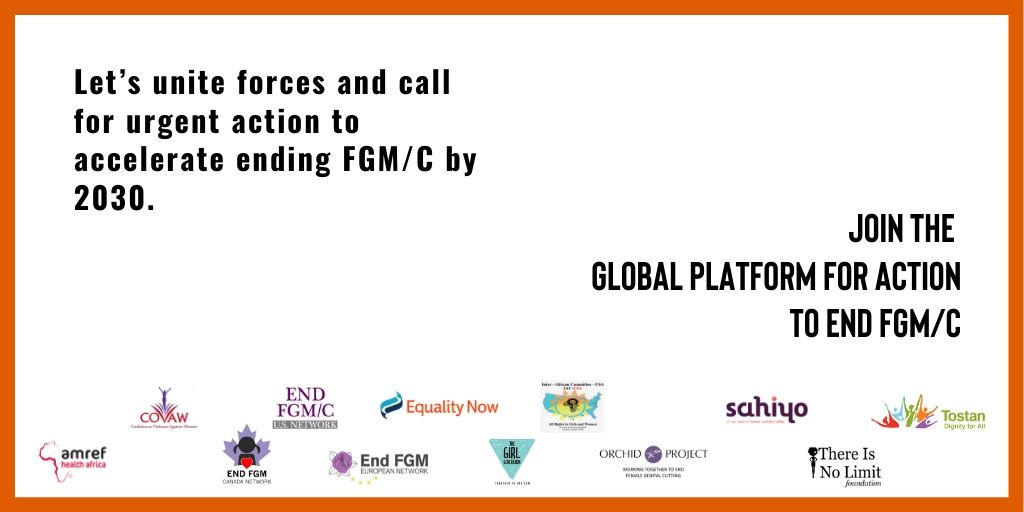
We must accelerate an end to FGM/C. Every 11 seconds a girl somewhere in the world will go through female genital mutilation/cutting (FGM/C.) The procedure is often extremely painful, and carried out with a crude, unsterilized instrument and without anesthesia. Every 11 seconds. FGM/C has no medical benefits, and often has disastrous effects, including a lifetime of psychological trauma, difficulty urinating and menstruating, maternal and child mortality, lack of sexual fulfilment, and sometimes, most tragically, the loss of a girl’s life afterwards. This violation of a girl’s fundamental human rights has no place in the world today. It must stop. Now. Last June at the Women Deliver Conference held in Vancouver, for the first time, global FGM/C activists from Africa to Europe, from Australia to Asia and to North America; women and men, civil society organisations, champions, survivors, and grassroots representatives, all came together to unite voices around a global call to action to end FGM. Together, we are asking, no imploring, the international community to prioritize the ending of FGM/C worldwide, in the same way it responded to other urgent global issues such as HIV/AIDS. It’s estimated that 200 million women alive today are survivors of FGM/C. It is practiced on every continent except Antarctica. There’s no religious requirement for it, and it is practised in Muslim, Christian, Pagan, and even some Jewish communities. There can be little doubt that female genital mutilation/cutting is among the worst human rights violation perpetrated against women and girls in the world today. The practice continues because it is a social norm held in place by the expectations of whole communities–women, men, elders, even politicians. And it continues to be a taboo subject, hidden behind a wall of silence around the world. This too must stop. Next week, at the International Conference on Population and Development (ICPD) in Nairobi, where gender equality and reproductive and sexual rights are high on the list of priorities, there is a tremendous opportunity to shine a giant light on the issue of FGM/C and move it firmly to the top of the agenda where it belongs. Kenya’s President Uhuru Kenyatta, sitting beside Canada’s Prime Minister Justin Trudeau at Women Deliver in Vancouver just a few months ago, courageously committed to ending FGM/C in Kenya by 2022, eight years ahead of the Sustainable Development Goal of 2030. It’s an ambitious promise, a challenging target for sure–but it shows leadership, it shows vision, it shows a commitment to the idea that girls’ human rights must be cherished, must be protected. We hope that other governments around the world will follow and commit resources, improved data and research, laws and policies to protect girls at risk, and support for survivors, so that together we can end FGM/C around the world. The End of FGM/C is not just the end of a violation of girls’ human rights, it is also the start of increased economic development for practicing communities and has the power to be completely gender transformative. It is a proven fact that when girls and women fully participate in the economy of a country, it results in significant economic advancement. And so, we ask the global community at the ICPD to join us, to work together on a multi-pronged approach to end FGM/C by 2030. Whole communities must be mobilized and empowered at the grassroots level. Women and men, girls and boys, health workers, traditional and religious leaders, all have to be empowered to embrace the end of this harmful traditional practice. We have to address the root causes of gender equality at the community level; we have to listen to and support grassroots organizations that are working in this field; we need an integrated, intersectional approach to ending FGM/C, recognizing the connections with other forms of gender-based violence and linking with existing movements. We have to work with governments to respond to the adaptations to this violation of girls’ and women’s human rights, include medicalization, cross-border practices, and lowering the age of mutilation/cutting. Accordingly, we call on all stakeholders to prioritize resources towards grassroots and community led programmes, and to make funding more flexible, sustainable, and accessible. Whatever our religion, our gender, our ethnicity, –the time has come for every one of us and all our governments to deploy every tool at our disposal to end this harmful practice. FGM/C is a human rights emergency that continues to exact untold harm on a daily, hourly basis. Together we can end it. Sign up to the Global Platform for Action to End FGM/C today at www.ActionToEndFGMC.org. This call to action has been endorsed by Amref Health Africa, Coalition on Violence Against Women, End FGM Canada Network, End FGM European Network, Equality Now, Orchid Project, Sahiyo, The Girl Generation, The Inter-African Committee on Traditional Practices, The US End FGM/C Network, There Is No Limit Foundation and Tostan.
Global Call to Action From “Uniting forces to make female genital mutilation/cutting a practice of the past: A gathering for global civil society actors”

On June 2, 2019 in Vancouver, Canada, civil society organisations, champions, survivors and other grassroots representatives came together at Women Deliver 2019 to unite voices around a global Call to Action to end female genital mutilation/cutting (FGM/C). The pre-conference was an unprecedented gathering as a sector working globally across the issue to discuss what is needed to accelerate ending FGM/C by 2030. The event put grassroots voices at the centre and worked to strengthen our unified community of practice to support the achievement of Sustainable Development Goal 5.3. (eliminate all harmful practices, such as child, early and forced marriage and female genital mutilation). “Uniting forces to make female genital mutilation/cutting a practice of the past: A gathering for global civil society actors” involved more than 100 participants in Vancouver. More than 270 additional participants shared their expertise and experience through an online survey. The event was co-ordinated through a core group of globally representative organisations that managed logistics: Amref Health Africa, Coalition on Violence Against Women, End FGM Canada Network, End FGM European Network, Equality Now, Orchid Project, Sahiyo, The Girl Generation, The Inter-African Committee on Traditional Practices, The US End FGM/C Network,There Is No Limit Foundation and Tostan. Participants in Vancouver endorsed the following Call to Action: PREAMBLE FGM/C is a violation of the human rights of women and girls and must be ended in all its forms We need to make FGM/C a global priority, in the same way the global community responded to other global epidemics, such as HIV/AIDs SUPPORTING CHANGE FROM WITHIN – CHALLENGING SOCIAL AND GENDER NORMS We share a vision of a world free from FGM/C and will work in partnership with each other, all communities, governments, donors, multilateral bodies and others to end the practice by 2030 in line with the SDGs Whole communities must be mobilised and empowered at the grassroots level if we are to end FGM/C – women and girls, men and boys, traditional and religious leaders, health workers Ending FGM/C requires addressing the root causes of gender inequality at the community level, including gender stereotypes, unequal power relations, and negative social norms STRENGTHENING THE EVIDENCE BASE THROUGH CRITICAL RESEARCH Fill the knowledge gap on FGM/C survivors’ specific needs, impact on economic empowerment, and behaviour change around emerging trends such as medicalisation and lower ages of cutting Use community-based participatory approaches within research efforts and ensure that research results and data are synthesised for communities to use Create, test, and implement standardised universal indicators that are informed by context specific measures and demand country-level reporting IMPROVING WELLBEING VIA SUPPORT AND SERVICES FOR SURVIVORS More support is needed for survivors in various forms, including security and protection for survivors, targeted research and resources to enable health and emotional wellbeing Enable the transformative power of survivors and survivor-led networks through support to connect with each other, other gender-based violence movements and capacity build ADDRESSING EMERGING TRENDS AROUND FGM/C We need an integrated, intersectional approach to ending FGM/C recognising the connections with other forms of gender-based violence and linking with existing movements We are committed to working with religious leaders, health workers and governments to respond to adaptations to the practice which continue to violate women’s rights, such as medicalisation, cross-border practices, and lowering the age at which FGM/C is carried out INCREASING RESOURCES TO ACHIEVE THE GLOBAL GOAL We call on all stakeholders to prioritise resources towards grassroots and community-led programmes. Funds should be more flexible, sustainable and accessible for communities and grassroots and capacity building should be provided as well as networks Investment is needed in better research into what is working and what is not to end FGM/C. This research needs to be participatory and involve multiple stakeholders and should be made available and accessible We are focused on coming together and working collaboratively to address what existing gaps there are, what are the costs of FGM/C, and what do we need to end this globally See call to action as PDF here. Further Women Deliver blog posts: Joint Press Release: Ending FGM/C BY 2030: Uniting forces to make FGM/C a practice of the past Multiple events on FGC hosted at Women Deliver in Vancouver
PRESS RELEASE: A pioneering Roundtable to Address Female Genital Mutilation/Cutting in Massachusetts
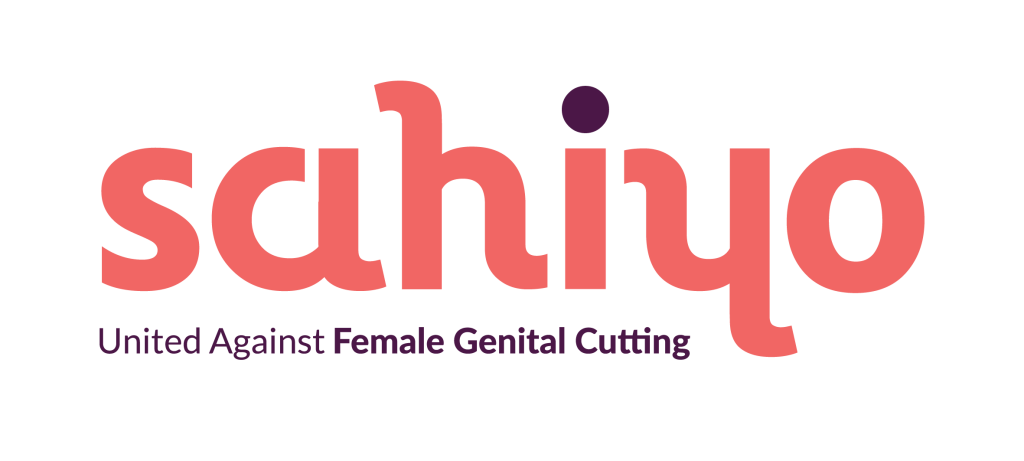
Download press release as PDF PRESS RELEASE: A pioneering Roundtable to Address Female Genital Mutilation/Cutting in Massachusetts Boston, Massachusetts, 14 June 2019 On June 13, 2019, a collective of almost 60 experts from different disciplines and cultural groups took the first steps to create a ‘Massachusetts End FGM/C Network’, to highlight the largely unrecognized global issue of Female Genital Mutilation/Cutting, and to share knowledge and resources to help end the practice. The experts gathered to attend the first of its kind roundtable to address FGM/C in the state of Massachusetts. They included community leaders, civic society organizations, health professionals, state government officials from the Massachusetts Legislature, and the Massachusetts Office of the Child Advocate, and federal government officials from the Department of Justice, and Department of Homeland Security Investigations. The event was organized and led by Sahiyo, a storytelling organization working to support survivors of FGM/C, with support from co-sponsors Muslim American Leadership Alliance (MALA), Tostan, MassNOW, Lesley University, the US End FGM/C Network, and the Women’s Bar Association of Massachusetts. A prevalence study conducted by the Center for Disease Control (CDC) and Prevention reveals that in 2012, over half of a million women and girls in the United States had FGM/C performed on them or were at risk of FGM/C. Massachusetts ranks 12th in the nation for at-risk populations, totalling 14,591, with the largest at-risk metro areas being Boston, Newton, and Cambridge. “I’ve undergone FGM/C and I know FGM/C is a global issue affecting women of all different ethnicities, religions, cultures, socio-economic status, and more,” said Mariya Taher, Sahiyo Cofounder and U.S. Executive Director. We need a global response to ensure future girls do not undergo it. We need to think globally and act locally.” “All are about the cultural control of women’s bodies,” s aid Representative Jay Livingstone in reference to FGM/C. Livingstone is a former prosecutor and co-lead sponsor of the Massachusetts FGM/C criminal bill – H. 3332 who connected the dots between this recent bill to Massachusett’s Equal Pay Act and other pending state legislation, such as The Roe Act. Rep. Livingstone expressed his hope that the FGM/C had bi-partisian support during this legislative session and would pass this session. Dr. Melody Eckhart, an OB/GYN at Massachusetts General Hospital, and Dr. Sondra Crosby, an internist at Boston Medical Center, spoke about their experiences working with patients who have undergone FGM/C and physical complications that can result, including shock, pain, hemorrhage, infection, and anemia. They warned of the long-term consequences of scar tissue and cyst formation impeding proper urination and menstruation, sexual dysfunction, and complicated labor and delivery, as well as fetal demise. They also called on the urgent need for educating health professionals on how to care for survivors — including addressing their psychological and emotional needs. “FGM/C is shrouded in secrecy even in the medical community,” said Dr. Crosby. “Health professionals need training in how to work with women in non-judgemental ways, how to make referrals, and how to treat the medical and psychological consequences of FGM/C, such as post-traumatic stress disorder and depression. Medical personnel need to understand the women’s FGM/C experience before they could diagnose and treat it.” The roundtable was a vital first step to create a multi-disciplinary working group that works to protect all girls in Massachusetts from experiencing this form of gender-based violence. For more information, contact Lara Kingstone at communications@sahiyo.com
